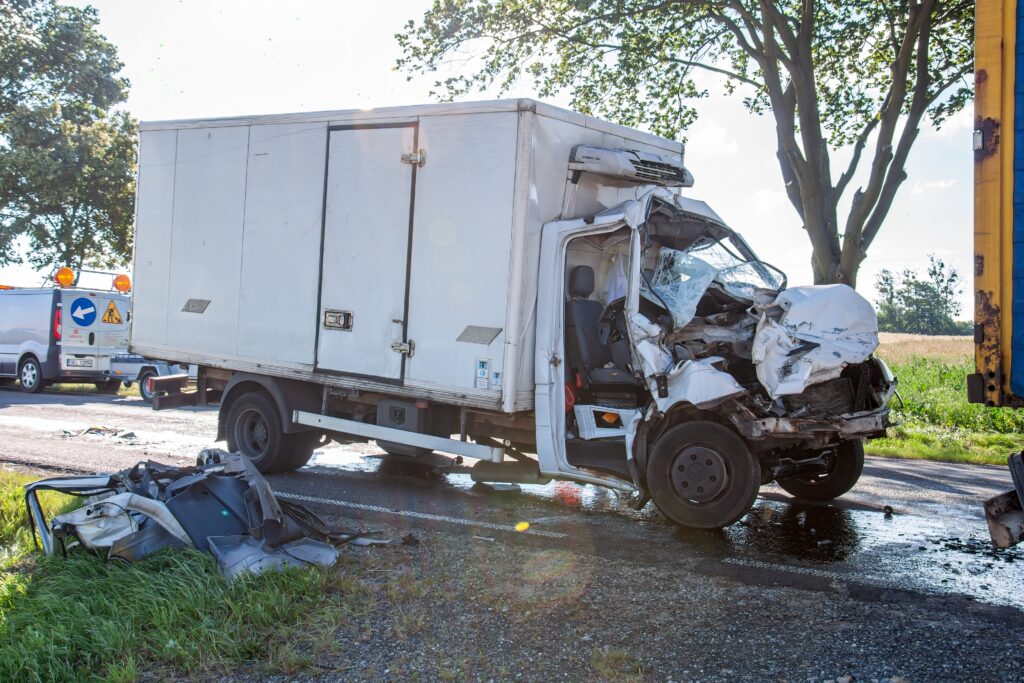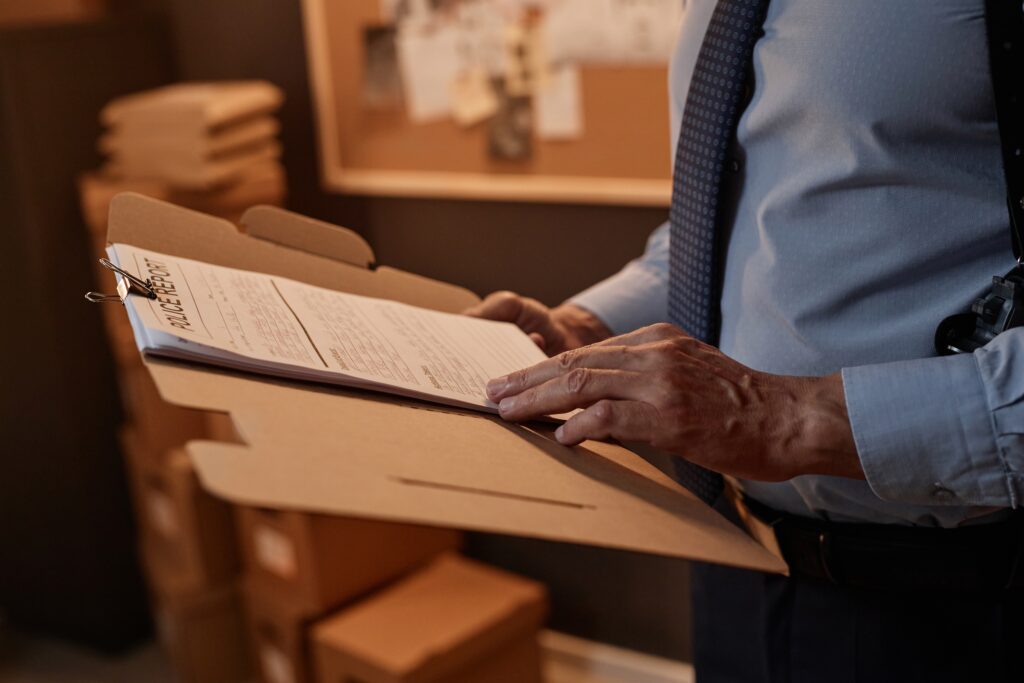When you've been in a truck accident, the road to recovery involves more than just physical healing. You also need to protect your rights and secure the compensation you deserve.
A key part of that process is preserving evidence from the accident. Without it, your Feasterville truck accident lawyer can face an uphill battle proving your case. But with the right approach, your attorney can gather, organize, and safeguard the information needed to support your claim.
The following is a look at how your truck accident attorney can take charge of preserving evidence in ways that will help your case and increase your chances of success.
Get A Free Consultation Today!
Feasterville Truck Accident Guide
- Securing the Scene: A Critical First Step
- Gathering Witness Testimonies
- Requesting the Truck's Electronic Data
- Obtaining the Driver's Records
- Examining the Trucking Company's Maintenance Records
- Inspecting the Truck for Mechanical Failures
- Working with Accident Reconstructionists
- Gathering Surveillance Footage
- Preserving Physical Evidence from the Vehicles
- Reviewing Police Reports and Emergency Response Records
- Preserving Medical Records and Documentation of Your Injuries
- Documenting Lost Income and Financial Losses
- Filing Freedom of Information Act Requests
- Monitoring Social Media and Online Activity
- Working with Independent Investigators
- Please Contact a Truck Accident Lawyer Immediately
Securing the Scene: A Critical First Step

After a truck accident, the crash scene holds vital evidence that may disappear if not documented right away. You might be unable to gather this information, which is where your attorney steps in. A truck accident lawyer understands the importance of acting fast to collect evidence directly from the scene.
Photos and videos are often the first items gathered. Your attorney will either visit the scene or work with professionals who can photograph the vehicles, the road conditions, skid marks, and any other environmental factors. The idea is to capture as much as possible before workers clear the area. These images can provide a wealth of information, like the position of the vehicles, the condition of the road, weather patterns, and other factors that can impact the case.
Gathering Witness Testimonies
Eyewitnesses to a truck accident can offer perspectives that no amount of physical evidence can provide. Their accounts of what happened can make or break a case. Your truck accident lawyer will quickly track witnesses and record their statements. Witnesses can describe the speed of the vehicles and the driver's actions or even confirm whether anyone was using a phone or violating traffic laws.
People's memories fade quickly, so getting these statements on record as soon as possible is vital. Your attorney might use written or recorded statements to lock in these testimonies for future use in negotiations or at trial. These statements often reveal details that paint a clearer picture of what occurred, allowing your truck accident lawyer to present a stronger case.
Requesting the Truck's Electronic Data
Commercial trucks have electronic logging devices (ELDs) that record data such as the truck's speed, location, and braking activity. These devices are like the "black boxes" in airplanes, and they can be pivotal in reconstructing how the accident happened. However, this data isn't kept forever. Trucking companies are only required to preserve it for a limited time before it's overwritten or deleted.
Your lawyer will send a letter to the trucking company, often called a "spoliation letter," requesting that all relevant data be preserved. The letter legally obligates the company to hold onto the information, ensuring that valuable evidence isn't destroyed. Without this step, you risk losing key data that can prove the truck driver's fault or reveal safety violations.
Obtaining the Driver's Records
In any truck accident, the driver's records can provide important insights into whether they followed safety regulations. Your truck accident lawyer will obtain the driver's logbooks, which record hours driven, rest breaks taken, and other critical factors governed by federal regulations. If a driver exceeded the allowed number of driving hours or skipped mandated breaks, it can point to fatigue, commonly the cause of truck accidents.
Beyond the logbooks, your attorney may also request the driver's employment history, training certifications, and drug and alcohol test results. All of this information can contribute to building a strong case. For instance, if the driver has a history of violations or failed a drug test, it can significantly impact liability in your claim.
Examining the Trucking Company's Maintenance Records
Trucking companies are responsible for ensuring their vehicles are safe to operate on the road. Regular maintenance is a legal requirement, but not all companies comply. Your truck accident attorney will request maintenance records for the truck involved in the accident. These records will show whether the company performed routine inspections, replaced faulty parts, and ensured the vehicle met safety standards.
If the truck's brakes, tires, or other components were not properly maintained, that information can become a central part of your claim. Your attorney will also review the company's policies to see if they prioritize safety or cut corners to save costs, potentially putting profits over people's lives. Evidence of negligence by the trucking company can significantly strengthen your case.
Inspecting the Truck for Mechanical Failures
Sometimes, the cause of a truck accident isn't driver error but mechanical failure. In such cases, your lawyer will arrange to inspect the truck itself. This step requires acting quickly because trucking companies often repair or dispose of damaged trucks shortly after an accident.
By conducting an inspection, your attorney can determine whether any truck parts, such as the braking system, tires, or steering mechanism, were faulty during the crash. An expert in vehicle mechanics might also be called in to analyze the findings. This physical evidence can be powerful in showing that the accident wasn't simply a driver error but a failure of equipment that could have been prevented with proper maintenance.
Working with Accident Reconstructionists
A significant part of preserving evidence is piecing together how the accident happened in the first place. Your truck accident lawyer might call on an accident reconstructionist to recreate the scene. These professionals use evidence like skid marks, vehicle damage, and data from the truck's black box to form a detailed picture of the moments leading up to the crash.
The reconstruction can show whether the truck driver was speeding, braking too late, or changing lanes improperly. It can also reveal environmental factors like how wet roads or poor visibility might have contributed to the collision. Armed with this reconstruction, your truck accident lawyer can present a compelling argument highlighting the specific actions that led to the crash.
Gathering Surveillance Footage
In today's world, cameras are everywhere – on traffic lights, businesses, and even private homes. If your accident occurred in a busy area, there's a good chance that some of it was caught on video. Your attorney will identify potential sources of surveillance footage and work to secure copies before they're erased or overwritten.
Video footage can be one of the most convincing evidence in a truck accident case. It provides a clear, objective view of what occurred, removing any doubts about what happened. Whether it's showing the truck running a red light or failing to stop in time, video evidence can be instrumental in proving your claim.
Preserving Physical Evidence from the Vehicles
After a truck accident, both your vehicle and the truck itself are likely damaged. But instead of scrapping your car or getting immediate repairs, preserving the physical evidence from the vehicles is important. Your truck accident lawyer might recommend that you hold off on repairing or replacing your vehicle until it's been thoroughly inspected and photographed.
The damage to the vehicles can reveal the speed at which the truck was traveling, the angle of impact, and even how the force of the collision affected you inside the car. In some cases, the vehicles are used as physical evidence in court, allowing jurors to see the accident's severity firsthand.
Reviewing Police Reports and Emergency Response Records

When police arrive at the scene of a truck accident, they gather their information. They interview drivers, passengers, and witnesses, assess the damage, and create a detailed report. Emergency responders may also document their findings, including the injuries they observed and the actions taken to treat them.
Your truck accident lawyer will obtain copies of all relevant reports, which often include important details that can support your claim. These reports are an official accident record and can corroborate your version of events. If the police issued any citations to the truck driver, such as for speeding or reckless driving, that information becomes a powerful part of your case.
Preserving Medical Records and Documentation of Your Injuries
Evidence of your injuries is just as important as evidence from the crash scene. After a truck accident, you'll likely receive medical treatment, whether it's a trip to the emergency room or follow-up visits with your doctor. Your lawyer will gather all medical records, bills, and documentation of your injuries to demonstrate how the accident impacted your health.
Medical records can include X-rays, MRIs, surgery notes, and doctor's evaluations. Together, they paint a full picture of the injuries you've sustained and the long-term consequences you face. These records also tie your injuries directly to the accident, making it difficult for the other side to argue that your injuries came from another source.
Documenting Lost Income and Financial Losses
Truck accidents often result in more than just physical injuries. The financial burden of medical bills, vehicle repairs, and time off work can add up quickly. Your truck accident attorney will document all financial losses resulting from the accident. This includes pay stubs, tax returns, and employer statements showing how much income you've lost while recovering.
By preserving this financial evidence, your lawyer can accurately calculate the compensation you're entitled to. It's important to include not just current losses but future financial impacts as well. For example, if your injuries prevent you from returning to work in the same capacity, you can be entitled to compensation for future lost earning potential.
Filing Freedom of Information Act Requests
Sometimes, important evidence isn't readily available from the trucking company or at the crash scene. In certain cases, your lawyer may need to file Freedom of Information Act (FOIA) requests to obtain government records that can support your claim. This can include road maintenance records, traffic signal data, or records from the Department of Transportation regarding the trucking company's safety violations.
FOIA requests allow your truck accident lawyer to access public records that are otherwise difficult to obtain. This information can provide context for the accident, such as whether poor road maintenance played a role or if the trucking company had a history of safety violations. Your lawyer can build a comprehensive case by gathering as much information as possible.
Monitoring Social Media and Online Activity
Social media can play a surprising role in truck accident claims. The trucking company and the driver may post information online that can impact your case. Your truck accident lawyer will monitor social media accounts, blogs, and forums to see if any relevant information is posted after the accident. This can include admissions of fault, photos of the truck, or even discussions about the accident.
On the flip side, your own social media activity can also affect your claim. Your attorney will likely advise you to limit your posts about the accident and avoid sharing details about your injuries. Insurance companies often monitor claimants' social media profiles. They can take a seemingly harmless post out of context and use it to challenge the validity of your injuries.
Working with Independent Investigators
While the trucking company and insurance companies may conduct their investigations, your truck accident lawyer may bring in independent investigators to conduct a thorough and unbiased review of the accident. These investigators will interview witnesses, review the physical evidence, and analyze the accident scene to ensure no stone is left unturned.
Independent investigators provide another layer of scrutiny to ensure the trucking company and their insurance adjusters aren't the only ones controlling the narrative of what happened. Your attorney will ensure that these investigators preserve the evidence they gather, making it available for your case and providing additional resources for settlement negotiations or a trial.
Please Contact a Truck Accident Lawyer Immediately

Preserving evidence is the foundation of any successful truck accident claim. Your truck accident lawyer takes charge of this process, ensuring that nothing important slips through the cracks.
By having your truck accident lawyer act quickly and efficiently, you'll increase your chances of securing fair compensation for your injuries, financial losses, and suffering. Evidence is the backbone of your claim, and with your attorney's help, it will be preserved and presented to maximize your likelihood of success.
The earlier you schedule a free consultation, the earlier your lawyer can gather, collect, and preserve that critical evidence. Please contact a Feasterville personal injury attorney as soon as you can.
